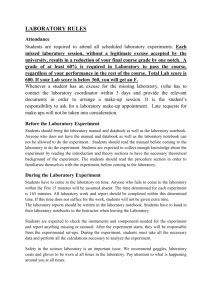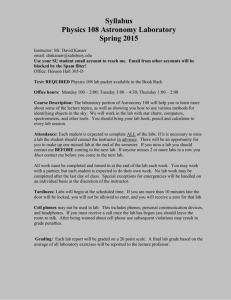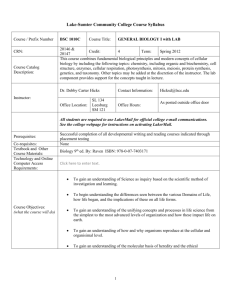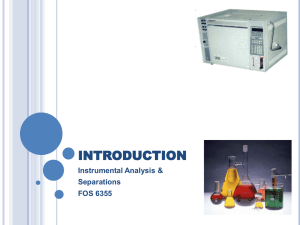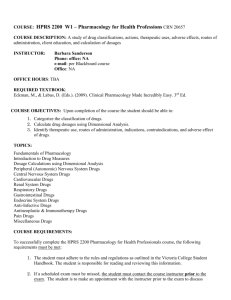Lab_Syllabus - Abraham Baldwin Agricultural College
advertisement
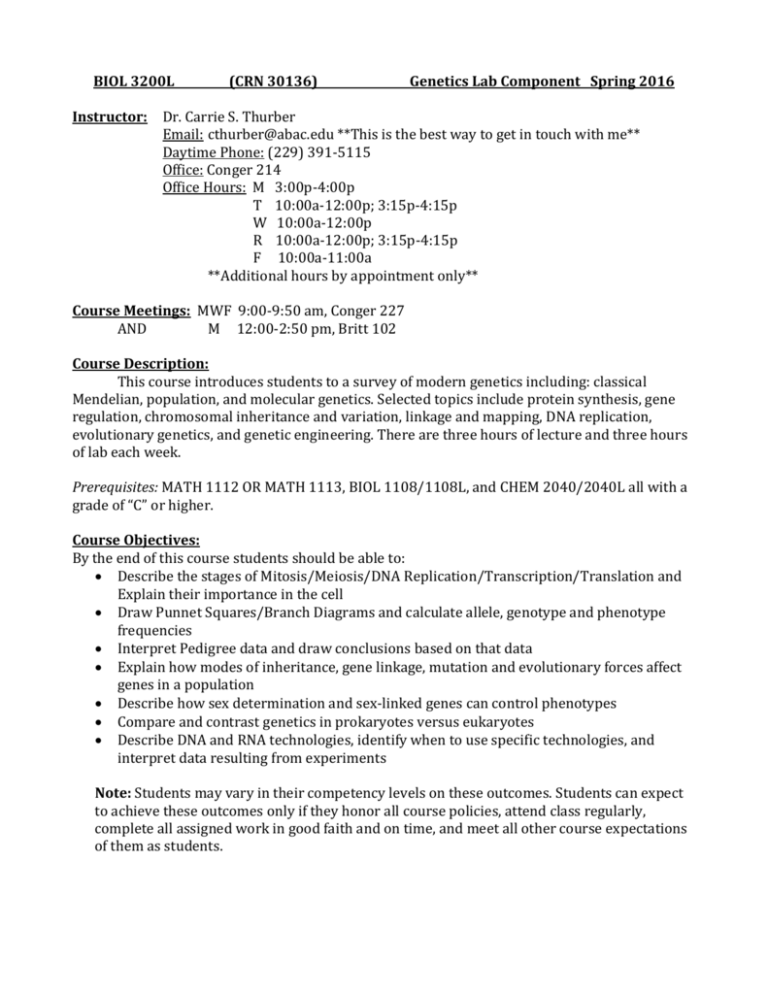
BIOL 3200L Instructor: (CRN 30136) Genetics Lab Component Spring 2016 Dr. Carrie S. Thurber Email: cthurber@abac.edu **This is the best way to get in touch with me** Daytime Phone: (229) 391-5115 Office: Conger 214 Office Hours: M 3:00p-4:00p T 10:00a-12:00p; 3:15p-4:15p W 10:00a-12:00p R 10:00a-12:00p; 3:15p-4:15p F 10:00a-11:00a **Additional hours by appointment only** Course Meetings: MWF 9:00-9:50 am, Conger 227 AND M 12:00-2:50 pm, Britt 102 Course Description: This course introduces students to a survey of modern genetics including: classical Mendelian, population, and molecular genetics. Selected topics include protein synthesis, gene regulation, chromosomal inheritance and variation, linkage and mapping, DNA replication, evolutionary genetics, and genetic engineering. There are three hours of lecture and three hours of lab each week. Prerequisites: MATH 1112 OR MATH 1113, BIOL 1108/1108L, and CHEM 2040/2040L all with a grade of “C” or higher. Course Objectives: By the end of this course students should be able to: Describe the stages of Mitosis/Meiosis/DNA Replication/Transcription/Translation and Explain their importance in the cell Draw Punnet Squares/Branch Diagrams and calculate allele, genotype and phenotype frequencies Interpret Pedigree data and draw conclusions based on that data Explain how modes of inheritance, gene linkage, mutation and evolutionary forces affect genes in a population Describe how sex determination and sex-linked genes can control phenotypes Compare and contrast genetics in prokaryotes versus eukaryotes Describe DNA and RNA technologies, identify when to use specific technologies, and interpret data resulting from experiments Note: Students may vary in their competency levels on these outcomes. Students can expect to achieve these outcomes only if they honor all course policies, attend class regularly, complete all assigned work in good faith and on time, and meet all other course expectations of them as students. Required Materials: 1. Lab Notebook 2. Safety goggles (w/shields) 3. ONE 882-E Scantron NOTE: A laptop computer may be needed, the instructor will announce those dates. Class website: https://abac.view.usg.edu/ (Desire2Learn) Grading: The total grade will be distributed in the following manner: Laboratory Citizenship 25 pts (Cleanup, Technique, Timeliness, Preparation & Participation) Lab Notebook Checks 40 pts (4 x 10 pts each) Pre-lab Problem Sets 20 pts (2 x 10 pts each) Lab Reports 40 pts (2 x 20pts each) Lab Practical Final 100 pts Total Points (carried over to lecture) 225 pts Specific Assignment Details: 1. Laboratory Citizenship Students are expected to keep the lab room and their lab bench clean, show good technique, an understanding of safety and proper equipment use, as well as come prepared ready to work ON TIME. Students who do not demonstrate these qualities or are not participating in class will lose points. You are STARTING with 25 points and points will be deducted for inappropriate behavior, lateness, missing goggles/incorrect attire, and being unprepared for lab. 2. Lab Notebook Checks At the end of certain labs (noted on schedule), I will be checking your lab notebooks for completeness and clarity. I expect to see ALL relevant data/conclusions from ALL experiments laid out in the notebook with ALL discussion questions/problems answered. There are a total of FOUR notebook checks worth 10 points each. There will be NO credit given for notebooks turned in LATE! 3. Pre-lab Problem Sets There will be two problem sets worth 10 points to prepare students for specific labs. 4. Lab Reports There are TWO lab reports due this semester. One will be after the Mendelian Genetic Experiment labs and the other after DNA Barcoding labs. The exact format of these reports and their grading rubric will be provided to you in a separate document closer to these labs. Each report is worth 20 points and time will be set aside to peer edit rough drafts. 5. Lab Practical Final The lab final will be set up in a practical format where you will answer multiple choice, short answer and/or practical demonstration questions based on ALL of the labs we have done this semester. You will need to bring your own scantron and pencil and the exam will be timed. You may bring a non-graphing (scientific) calculator. Students may not use programmable/ graphing calculators on exams or quizzes. The final laboratory examination cannot be dropped and must be taken by each student to receive full credit for the course. Cell phones, pagers, music players, and any electronic communication device must be turned off and out of sight during any testing periods. The wearing of earbuds is prohibited at any time during class, including during exams. Students may be asked to remove caps or turn them around during testing periods. Student enrolled in classes in the Division of Science and Mathematics will be expected to demonstrate an understanding of subject matter requiring higher order processing skills. Academic Policies: Lab Safety Policies: For labs, all students are required to wear closed toed shoes WITH SOCKS covering all skin on the foot and lower leg. All students must also wear short or long sleeved shirts (NO tank tops!) and long pants or long skirts (NO shorts or short skirts!) in order to protect their skin from the waist down in accordance with OSHA regulations. If a student arrives dressed inappropriately, they will NOT be allowed to participate in lab that day and will NOT be allowed to make-up the lab. Food and drink are strictly prohibited in the lab. Anyone who brings these items in will be asked to put them outside or throw them away in a trashcan in the hallway. Cell Phone Use Policy: Cell phones may NOT be used at any time during class, except to call 911 in case of an emergency. Cell phones may NOT be on the table/desk, your lap, or your hand. Cell phones must be silenced and in your bag or pocket for the duration of the lab. Anyone caught with a cell phone out during lab will lose 5 Lab Citizen points for each infraction! (This counts as your warning!) Please notify the instructor in advance if an emergency exists where you need your phone. Attendance Policy: Courses at Abraham Baldwin Agricultural College (ABAC) are provided for the intellectual growth and development of the students. The interaction with instructors and other students is an important element of the learning process, and a high correlation exists between class attendance and course grades. As such, it is expected that you will attend every lab session on time! The instructor will take roll or circulate a sign-in sheet at the beginning of class (~first 5 minutes). Any student not present at the time roll is taken and/or missing a significant portion of class will be counted absent. It is each student’s responsibility to keep up with all classroom activities; lecture notes (oral, written on the board, or on slides); and dates of exams, assignments, quizzes, etc. Additionally, students are expected to be present for EVERY exam session, except under emergency situations. Please come see me or email me if you know you will be missing an exam. I check my email frequently throughout the day between the hours of 7 am and 7 pm; you can expect a response generally within 24 hours (longer on weekends and holidays). Participation Expectations and Conduct: Students are expected to be prepared for lab (i.e. bringing a lab notebook, having read the materials prior to class and taken notes), participate actively in the discussion of materials, and be respectful of other people’s contributions and opinions. “An Abraham Baldwin College student is expected to show proper respect for order, morality, and the rights of others. Conduct which is normally reprehensible or which is of a disorderly nature and in violation of written policy shall subject the student to disciplinary action.” Participation includes both asking and answering questions posed during class. Please respect your classmates by not talking over them, ridiculing their contributions, or being disruptive to the discussion. In order to have a fruitful discussion everyone needs to participate and help create an open environment for dialog. Academic Conduct Code: Academic integrity is the responsibility of all ABAC faculty and students. Academic dishonesty and irregularities include, but are not limited to, giving or receiving of unauthorized assistance in the preparation of any academic assignment; taking or attempting to take, stealing, or otherwise obtaining in an unauthorized manner any material pertaining to the education process; selling, giving, lending, or otherwise furnishing to any person any questions and/or answers to any examination known to be scheduled at any subsequent date; fabricating, forging, or falsifying lab or clinical results; plagiarism in any form related to themes, essays, term papers, tests, and other assignments. Academic dishonesty and irregularities will result in a grade of 0 for the assignment and may be subject to disciplinary procedures as outlined in the student handbook. Please check with your course instructor if you have any questions about the conduct code. (http://www.abac.edu/wp-content/uploads/2012/11/Student-Handbook.pdf) Disability Accommodations: This course fully complies with the accommodations available through the office of disability services. If there is a student in this class who has documented specific needs because of learning disabilities or any other disability; please contact the course instructor immediately to discuss accommodations. Note: The schedule, policies, procedures, and assessments in this course are subject to change in the event of extraordinary circumstances, by mutual agreement, and/or to ensure better student learning. The instructor reserves the right to make modifications to the schedule and/or syllabus at any time. The lecture topics will be covered in the order listed above and exams will be given on dates specified; however, the instructor may modify the pace at which the material is covered; add or delete material; and/or modify the content covered on each exam. Students are expected to read relevant textbook chapters and/or assigned material prior to each class period. If the campus is closed due to inclement weather or class is officially canceled by the instructor, plan on the missed activities occurring on the next scheduled class day.
